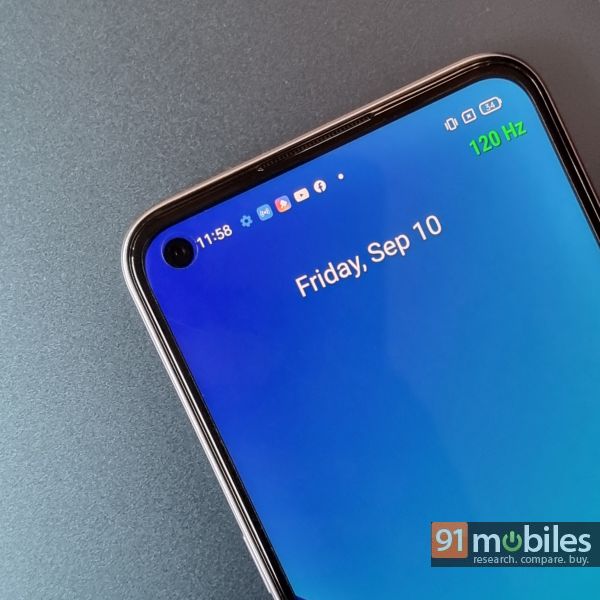Realme 8i Review – Pros and cons, Verdict | 91Mobiles
Realme has, time and again, made a splash in the affordable smartphone segment with enticing, VFM offerings. I still remember being starstruck by the Realme 6‘s (review) incredible performance. The device’s gaming-oriented Helio G90T SoC could run most, if not all graphically intensive games at competitive settings. That said, I wasn’t the biggest fan of the brand’s Realme 7i (review), partly due to the its Snapdragon 662 chipset.
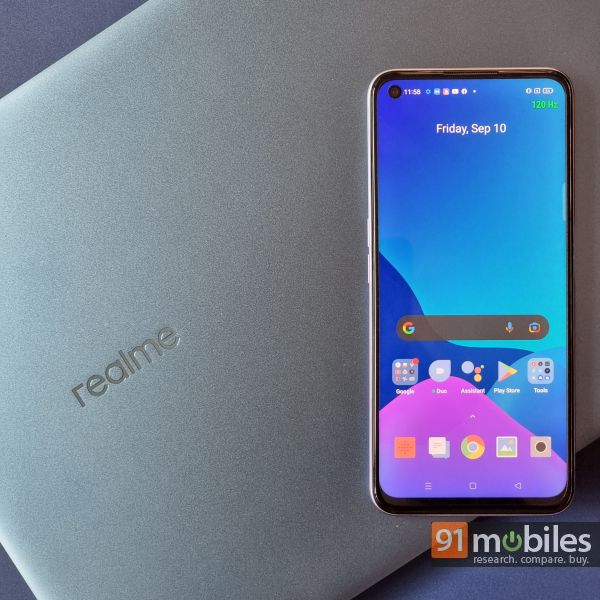
Regardless, Realme is back with yet another compelling mid-ranger in the form of the 8i smartphone. The latest entrant packs the all-new Helio G96 SoC, which per the brand, touts a 65 percent performance improvement over its predecessor, the Realme 7i. So, is the Realme 8i worth your bucks? Well, let’s find out in this review.
Verdict
The Realme 8i brings a slew of interesting features to the table, including a capable processor and a brand-new 50MP camera sensor. That said, the smartphone is not without its faults and faces stiff competition from the likes of the Redmi Note 10S.
Design
The Realme 8i’s USP is undoubtedly its performance, though the smartphone’s good looks deserve a mention too. The company has employed a polycarbonate build for its latest mid-ranger, with the back of the phone featuring a glossy gradient finish. I was sent the Space Purple colourway for review and sure enough, the smartphone’s shimmery back caught my eye from the word go. Of course, if you don’t want to be bedazzled by the handset’s over-the-top purple colourway, then you can pick the device in a more somber black hue as well. Regardless, from a distance, the Realme 8i looks gorgeous.

The handset’s in-hand feel, on the other hand, leaves something to be desired. To be clear, I have no issues with the spit and polish on offer here. In fact, the chassis feels quite sturdy and doesn’t creak or flex either. However, the handset’s ginormous screen demands you use the phone with two hands at all times. Furthermore, the smartphone’s glossy back is prone to smudges as well, so you’ll spend a good chunk of time wiping it clean.
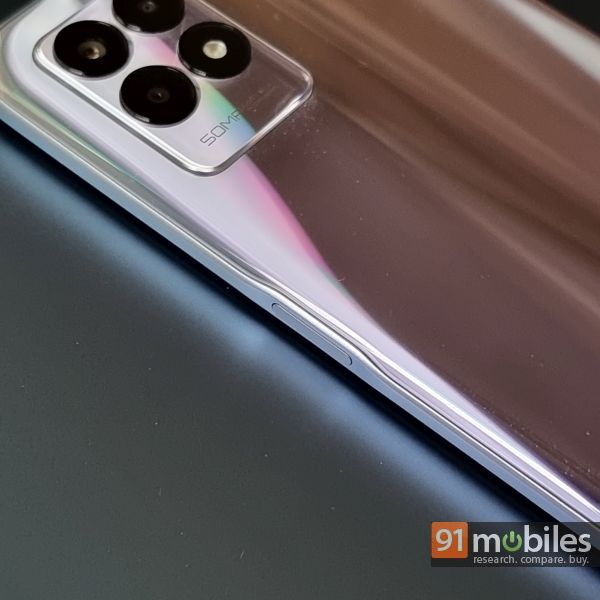
That’s not to say that Realme has completely binned the ergonomics of the 8i. On the contrary, the company has kept the weight of the phone under 200g (194g) and the handset doesn’t feel top-heavy either. Moreover, at 8.5mm, the 8i is relatively sleek as well, and the camera bump doesn’t protrude outwards either, ensuring you can use the phone when it’s laid flat on a table. However, there’s only so much you can do when operating a super-sized Android phone.
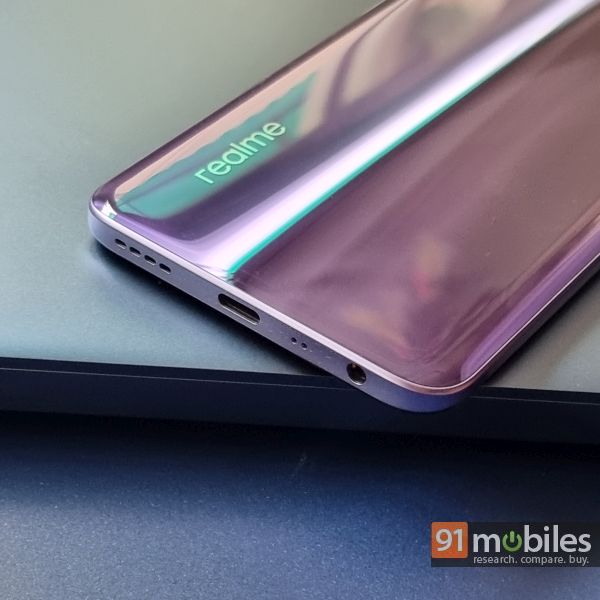
As for the I/O, the Realme 8i features a Type-C port and a headphone jack at the bottom. The device ships with a capacitive fingerprint sensor on its right fascia, which worked well during my stint with the unit. The facial recognition tech too, bode appreciable results, allowing me to unlock the phone seamlessly even in dim lighting conditions. Unfortunately, the smartphone’s haptics felt quite mushy. So, if you’re big on texting, I’d recommend you turn off vibration feedback when using the phone.
Display and Audio
As prefaced previously, the Realme 8i rocks a massive 6.6-inch LCD display. The panel offers a peak refresh rate of 120Hz, although Realme claims the display can smartly variate the refresh rate to better the device’s battery life. I did test the company’s claims and sure enough, the refresh rate automatically drops to 60Hz when viewing content on Netflix, or YouTube. That said, I couldn’t get the panel to drop to 48Hz when watching viewing or shows on the phone. In fact, the display refresh rate would only vary between 60Hz and 120Hz, be it watching IG reels, YouTube shorts, or movies on the handset.
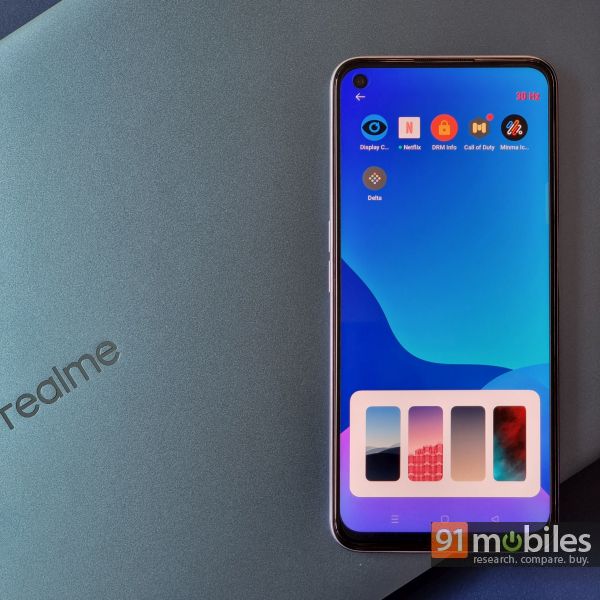
Other than that, the display offers Full HD+ resolution and touts a punch-hole notch positioned towards the top-left of the screen. The smartphone’s accommodating panel was a godsend for gaming as well as multitasking, though the viewing angles could’ve been better. You will be able to spot some backlit bleeding, and the blacks appear a tad grey as well. However, that is to be expected from an LCD panel and truth be told, you won’t make much of it when consuming media on the phone.
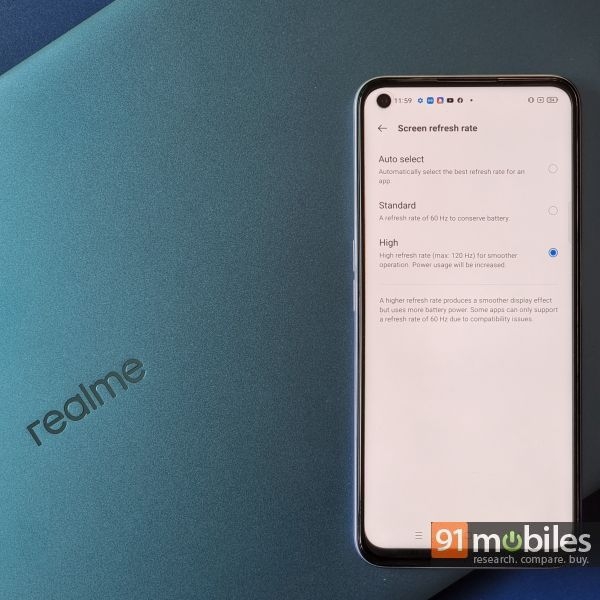
Speaking of which, the Realme 8i is WideVine L1 compliant so you should be able to make the most of HD streams via OTT services like Netflix. On the flip side, the handset doesn’t support HDR playback and the screen’s 600 nits peak brightness might not cut it when it’s too sunny outdoors. Thankfully, much like the competition, the Realme 8i’s screen also offers a touch sampling rate of 180Hz. As such, the device picked up on my taps and swipes just fine, so no complaints here. As for audio, the smartphone’s mono-speaker gets reasonably loud and doesn’t crackle or distort the sound at higher volume levels. Thankfully, the company has bundled a headphone jack with the phone, so you can listen to music or play games with no audio latency via a set of wired earphones too.
Cameras
The Realme 8i makes use of a 50MP Samsung S5KJN1 primary camera sensor that works alongside a 2MP B&W lens and a 2MP macro lens. For selfies, the device gets a 16MP front-facing camera. I’ve discussed the smartphone’s camera prowess below, so take a gander –
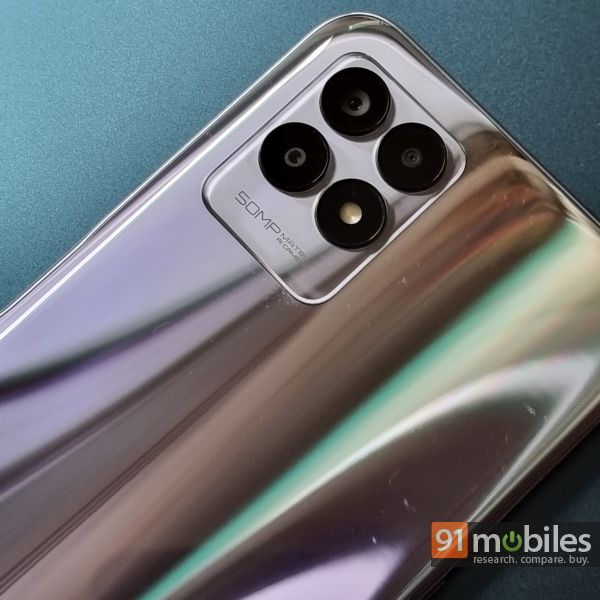
- I had high hopes for the smartphone’s 50MP primary shooter. Unfortunately, while I was satisfied with the sensor details, the smartphone’s post-processing mucks up the colours in the frame. As an example, if you look at the shot outside my office, then you’ll notice that the leaves look unnaturally green. Furthermore, the handset has played up the contrast a lot and objects in the darker areas have no definition. The same is evident if you pan your attention towards the dark blue car towards the bottom of the frame, which has been rendered a shade of black in the shot.
- As prefaced previously, the Realme 8i can snap sharp photos. In fact, the handset’s 50MP high-res shot retains a lot of details in the scene and mitigates noise to a great degree as well. Interestingly, I preferred the colour science of the 50MP shot as opposed to the pixel-binned photo, primarily because the handset doesn’t toggle HDR when snapping high-res photos.
- Thankfully, the smartphone’s front camera clicks appealing selfies. While the selfies appear a tad beautified even after disabling all of the beautification features, the end result isn’t all that bad. What’s more, the portrait selfies have a clean bokeh cutout too, which is great.
![]()
- That’s more than I can say about the handset’s macro sensor, though and not only did I struggle getting the sensor to focus on the subject, but the resulting images leave a lot to be desired, especially in terms of overall sharpness. The same can be said for lowlight images snapped with the 8i too and the handset takes a while to focus on the subject. Thankfully, images outputted with the night mode enabled offer good details across the board and the sensor even keeps instances of lens flaring in check.
Performance, Battery, and Software
The Realme 8i is backed by MediaTek’s Helio G96 SoC that works alongside either 4GB or 6GB of LPDDR4x memory. Additionally, the handset can allocate part of its storage to RAM and also offers 5GB of virtual memory. I didn’t find much use for the same during my stint with the phone, but your mileage could vary, especially if you opt for the 4GB variant of the phone. As for storage, the device offers either 64GB or 128GB of built-in, user-expandable storage.
So, how does the handset perform? Well, the smartphone’s day-to-day performance is fantastic and easily a notch above its predecessor, the Realme 7i. That said, the 8i’s gaming performance is a bit sketchy. In fact, compared to the Helio G95 chipset, the Helio G96 powering the 8i cannot run games like BGMI and CoD Mobile at comparable graphics and frame rate settings. To the company’s credit, this could be an optimisation issue with the new SoC. Be that as it may, the smartphone will limit gamers to Medium graphics and High frame rate on CoD Mobile, and HD graphics and High frame rate on BGMI.
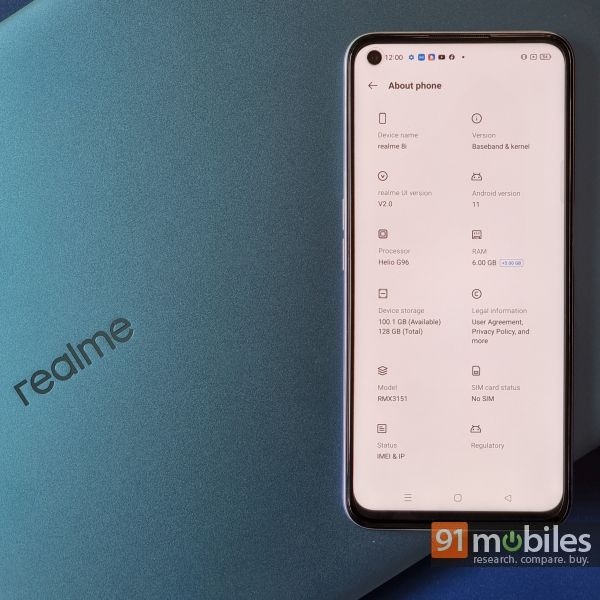
I should point out that the 8i goes the extra mile and offers a quality gaming experience. In fact, the handset ran CoD Mobile and BGMI without any lag or stutter, and the smartphone’s temps didn’t spike erratically either. Furthemore, the unit’s expansive screen ensured my fingers weren’t fighting for space. The same goes for benchmarks too and the device yielded promising numbers in synthetic testing apps like Antutu, AndroBench as well as GeekBench. In fact, the handset’s benchmark scores were slightly better than the G95-toting Redmi Note 10S (review) as well.
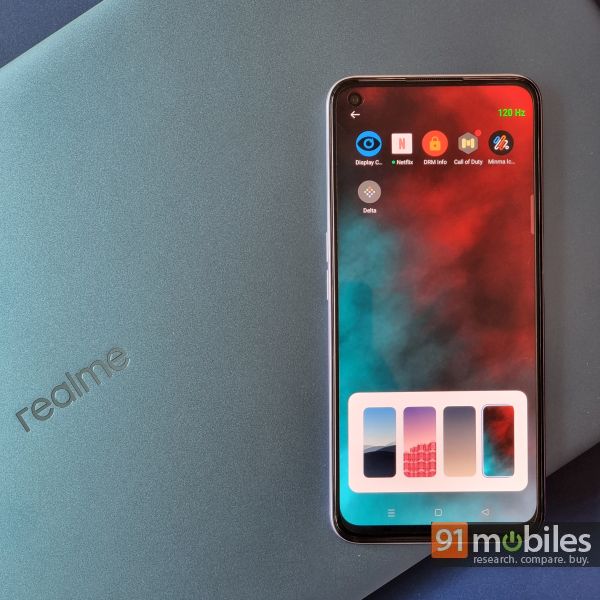
To sum up, the Realme 8i performs well, but the smartphone is in a dire need of an update that’ll allow gamers to further milk the SoC’s raw performance. As for software, the handset ships with Reame UI v2.0 on top of Android 11. Unsurprisingly, the interface ships with a ton of bloatware, so you’ll have to take out the time and uninstall irrelevant apps when you first set up the phone. Thankfully, unlike some custom skins, RealmeUI allows buyers to thoroughly customise their home screens by installing third-party icon packs, etc. You’ll also get some other niceties with the interface, including built-in call and screen recording utilities, screen on and off gestures, the works.
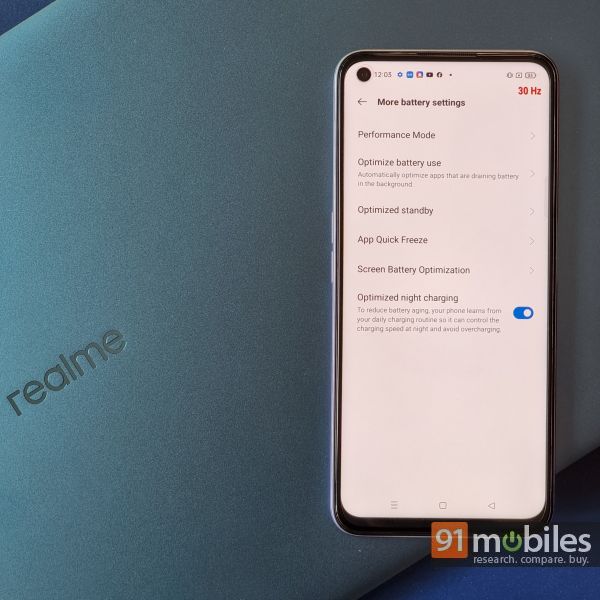
Moving on, the Realme 8i is backed by a 5,000mAh cell which should last you a full day off a single charge. I was using the phone with the display locked to 120Hz and the handset still had plenty of juice in the tank by the time I hit the bed. Of course, unlike the pricier Realme 8s, the Realme 8i doesn’t ship with a 5G enabled SoC. However, you’d be glad to know that the phone’s LTE connectivity is without any faults – I didn’t come across any call drops during my time with the phone on my Airtel postpaid SIM and the download speeds were to my liking as well.
Final Verdict
So, where does that leave us? Well, the Realme 8i retails for Rs 13,999 and Rs 15,999 for the 4GB and 6GB RAM variants respectively. For the price, the smartphone brings good performance, a big 120Hz display, and solid battery backup to the mix. Of course, the handset’s chipset has to be tweaked to support graphically-intensive games better. That said, having tested Helio G95 and Snapdragon 662-based devices like the Redmi Note 10S and the Realme 7i, I can confidently say that the Helio G96 chip is, in fact, a better performing SoC – it just needs to be optimised better. Lest I forget, the handset’s virtual memory should come in clutch for buyers opting for the 4GB RAM variant as well.
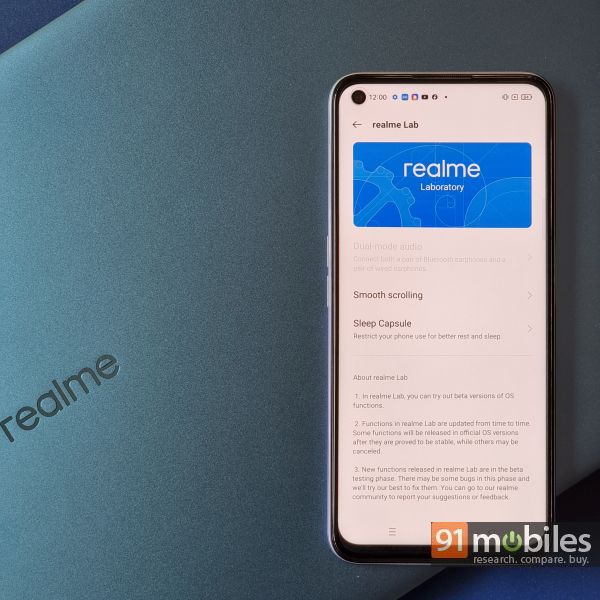
Unfortunately, the 8i is not without its faults and the handset’s camera performance is nothing to write home about. So, if you are looking for a reliable camera phone under Rs 15K, you might have to look elsewhere. Otherwise, the Realme 8i is yet another compelling option for buyers to consider in the sub Rs 15K segment.
Editor’s rating: 3.5 / 5
Pros:
- Expansive 120Hz display
- Performs well
- Good battery life
- Capable selfie camera
Cons:
- 50MP sensor oversaturates images
- Helio G96 needs further optimisation
- Lots of bloatware
For all the latest Technology News Click Here
For the latest news and updates, follow us on Google News.

